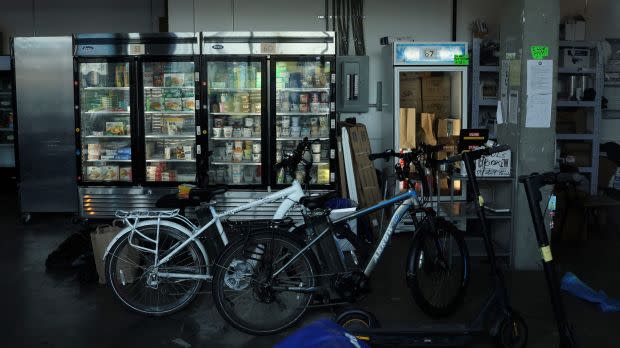15-minute grocery delivery startups are already folding

Delivery of just about everything became mainstream during the pandemic, and has rapidly evolved to include the so-called ultrafast delivery. But now that market is faltering.
Buyk, a New York-based 15-minute delivery service that delivered groceries and essential items, filed Chapter 11 earlier in March after ending operations in its 39 stores in New York City and Chicago. Manhattan-based instant grocery delivery startup 1520 closed up shop in December after less than a year. Meanwhile, Fridge No More, a Brooklyn-based service delivering groceries in New York City and Boston, has also shut down business “due to growing competition and other industry related issues,” the company tweeted March 11.
Venture capitalists invested nearly $4 billion in the ultrafast global delivery market in 2021, up from $500 million the year before, according to data from PitchBook, a market research firm. But now investors’ appetite for unprofitable delivery companies has waned, and they are looking for a clearer path of profitability in anticipation of higher interest rates. On March 24, Instacart said that it had cut its valuation by almost 40%, to $24 billion.
The ultrafast decline of 15-minute delivery
These companies pledge to deliver items like fresh produce and household goods in 15 to 20 minutes. The concept is similar to a convenience store, where there is a limited variety of goods. Fridge No More launched in October 2020, followed by Jokr, Gorillas, Buyk, in 2021. Gopuff, which has been around since 2013, entered New York in October 2021, followed by Turkey-based Getir in December 2021. Third-party delivery platforms are also dabbling in the market. In March, Instacart said it will offer super-fast delivery over the coming months in Atlanta and Miami.
“It's not unnatural that we're going to see a little bit of separating out of the losers,” said Tom White, a senior equity research analyst at DA Davidson, a financial services firm.
Ultrafast delivery companies are capital heavy startups, he said. Labor costs are high, as workers are more likely to be classified as employees than as gig workers. Intense competition forced companies to dole out large discounts to customers to capture market share. The infrastructure is costly, too, requiring fulfillment centers to be near customers’ homes in expensive urban centers.
What will be key for companies that last is being able to build a large marketplace and offering a broad array of items, he said.
Is this the end of 15-minute delivery in the US?
The closings are part of a broader consolidation in the US food delivery market and will likely continue to happen. “All these businesses, which are kind of dropship businesses of food, whether they're prepared or not, similarly started in this low interest rate environment, high valuations, disruptive business models, many of which are starting to fail today,” said Hans Taparia, a professor at New York University's Stern School of Business. “You're just seeing the cracks in them now.”
But that doesn’t mean the days of food delivery are over. The pandemic has pushed delivery mainstream and made ordering with a touch of a button a familiar habit. “Consumers are just increasingly coming to expect being able to procure more and more stuff from their smartphones,” said White. “And then once they can get more and more stuff, they expect that more and more stuff to be delivered quicker."
Sign up for the Quartz Daily Brief, our free daily newsletter with the world’s most important and interesting news.
More stories from Quartz:

